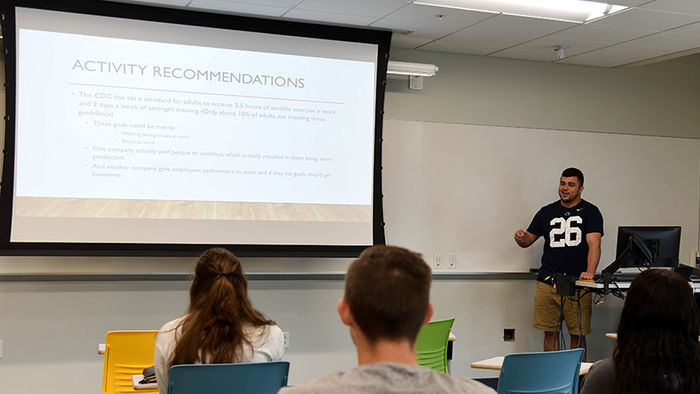Involvement in undergraduate research can be a highlight of your college career, increasing your chances of reaching your career goals and helping you get into graduate programs and professional schools. Students who conduct research with kinesiology faculty can present their work at local, regional, national, and international conferences. This can lead to student-co-authored publications in prestigious journals such as the Journal of Sports Sciences, Human Movement Science, the Journal of Medical Education, and others.
Undergraduate research is not like other courses. Typically students are working on research projects in which the faculty member has invested interests and positions are competitive. Faculty members look for students who are very motivated, interested in the subject matter, and well-organized. Some faculty members look at the performance of the students in their kinesiology classes (i.e., KINES 100, KINES 101). Many faculty members give preference to students who are staying at Penn State Altoona for four years and/or are willing to do research for more than one semester. Independent study (KINES 495) opportunities are also available for research assistants. The expectations for students that are chosen for undergraduate research vary and should be discussed with the faculty member. In most cases, three to four hours of work in the lab are expected per week for each credit hour.
For more information about research opportunities, available positions, and individual qualifications, visit the kinesiology faculty page or review the list below of research projects currently being conducted by kinesiology faculty. To inquire about available positions, make an appointment with the appropriate faculty member.
Summer research is also a possibility. The Office of Research and Sponsored Programs offers competitive summer undergraduate research grants of up to $1500. To obtain one of these grants, students must inform a faculty member by the end of February.
Current Kinesiology Research Projects
Applied Exercise Physiology Laboratory
Goal: Elucidate the optimal combination of exercise and nutrition to maximize treatment adherence, improve metabolic health, and halt disease progression in adults with obesity and associated co-morbidities. Engage with individuals at our university and in the surrounding area to improve the health and well-being of our community using dietary and exercise interventions.
If you are interested in working as a research assistant in the applied exercise physiology laboratory, contact Tracey Elkin.



